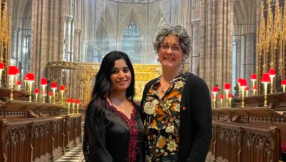
I recently visited Sutton Hoo in Suffolk. It lies just across the River Deben from the town of Woodbridge. It is a fascinating place whose story takes us back to the beginnings of the history of England.
In 1939, local archaeologist Basil Brown was employed by the landowner, Edith Pretty, to excavate burial mounds near her home. He and his helpers – and then the team of eminent archaeologists hastily assembled to complete the excavation – found a remarkable burial that had been placed in a huge boat and which included amazing treasures in gold, garnet and silver.
As well as items made locally, there were coins from across the Channel in the Frankish lands and silver objects from the Eastern Roman Empire centred on Constantinople. These had almost certainly come as diplomatic gifts designed to make politically useful connections with a person who was clearly of great importance. Other items came from the Celtic West, but whether these came as gifts, tribute or booty is hard to tell. These were violent times.
Most experts now think that the person buried at Sutton Hoo was Redwald, king of the East Angles, who died in 625. He had become overlord of the southern English when he defeated an attack by the mighty king of Northumbria. He was king just over two hundred years after the end of Roman rule in Britain and ruled one of the tribal kingdoms which emerged out of two centuries of invasion, warfare and kingdom-building. His royal family were the 'Wuffings' – the 'wolf-people.'
The National Trust has done a great job explaining the place, the finds, their context and their discovery. Many people have now also become acquainted with the story of Sutton Hoo by watching the film 'The Dig', released on Netflix earlier this year.
I had not visited the actual site for many years but, as I did so this summer, I was struck once more by how the story of Sutton Hoo still resonates with issues that are very much alive in the modern British Isles and especially so for Christians.
England, in its origins, was an international nation
Redwald ruled at a time when the pagan communities of early Anglo-Saxon England were beginning to convert to Christianity. The British (Celtic) kingdoms of the West were already Christian, their faith dating from the Roman Empire. In fact, they took it as one of their most significant characteristics that set them apart from the barbarian pagan settlers who had seized control of large areas of Eastern Britain in the two hundred years since the end of Roman rule.
Incidentally, modern DNA studies suggest that these Germanic newcomers made up only about 30% of the population at the time. The rest must have been indigenous Romano-British people who adopted the culture and language of the new elites that had seized power. So much for the notion of the 'pure blooded English.'
Redwald lived at a time of extraordinary tension and change. Already, King Ethelbert of Kent – who was married to a Christian Frankish princess – had converted to Christianity after missionaries from Rome arrived in Kent in 597. According to the later Anglo-Saxon historian Bede, the pope had famously met Anglo-Saxon slaves in Rome and remarked: "They are not Angles but Angels." Or as one later historian deliberately mistranslated it: "Not Angles but Anglicans!"
Well, the mission did begin the Church in England, although not the Church of England, as that originated in a power-grab by Henry VIII, which nationalised the English bit of the universal Catholic Church!
In converting, the Anglo-Saxon kings brought their kingdoms into the international family of Christian nations which united Western Europe with the Mediterranean. In the century that followed, the emerging Anglo-Saxon Christian community was transformed by two men: Theodore and Hadrian. Theodore was a Syrian and was archbishop of Canterbury from 668 to 690. Hadrian, Bede says, was "a man of African race" from Libya, who became abbot of Saint Peter's and Saint Paul's Monastery in Canterbury. Both were refugees from wars in the Middle East. It sounds very twenty-first century. The two men worked together to create an educational powerhouse. To become Christian was to join the international community of Christendom.
Redwald accepted Christian baptism but combined this with continued worship of pagan deities. He attempted to balance two rival ideological and political forces: Christianity which was combined with an alliance with the western superpower of the age (the Christian Frankish Empire), and the pagan North Sea world of Germanic Europe and Scandinavia. That is why his ostentatiously pagan burial also contains objects from the Christian world to the east. Modern Christian nationalists might want to ponder the internationalism of the Anglo-Saxon church.
Models of conversion?
The other thing that Sutton Hoo got me thinking about was how modern Christians should react to life in a largely non-Christian society. Today, a lot of Christians of a certain age (and note, I am in my 60s) tend to look back fondly to an apparent 'Golden Age' of Christian influence. Well, I question the grounds for that optimistic hindsight. Under cover of apparent Christian ascendancy was a country where sexual abuse often went unreported, police corruption was all too common, women faced open discrimination along with a lot of molestation in the workplace, and those renting property could put up a notice declaring: "NO IRISH, NO BLACKS, NO DOGS." Such 'Golden Ages' exist only in (failing) hindsight.
Anyway, today the UK is arguably not a Christian nation in any truly meaningful sense. What to do about that? Panic? Bemoan modern society? Demand the government defend our Christian culture? The world of Sutton Hoo offers us both a challenge and a warning.
The challenge is not to get in a panic. In the seventh century, active Christians took the message to the people. They did not expect them to come and collect the message. Active and engaging missionary work sought to find common ground with people and build on it. Missionaries were instructed to use existing places and events for Christian activity. They did not run scared of what they considered 'spiritual contagion.' They were confident in the message and in the one it was centred on.
The warning, is not to rely on institutional power to truly advance the gospel. Relying on the support of Anglo-Saxon kings was useful but it soon hit its limitations. You can't force people to believe. Bede tells an alarming story of a bunch of monks in northern England who got into trouble on a tidal river and were being swept out to sea. Peasants in the fields laughed and cheered as the monks were carried away by the surging water. The onlookers commented that the monks had taken away the worship of the old gods but put nothing (as far as they were concerned) in place of it. That is disturbing. The lesson? You can't legislate people into the Kingdom of God. You can only share and encourage them to experience it for themselves.
Three hundred years after Redwald, huge areas of Eastern and Northern England were lost to new pagan incomers: the Vikings. A few years ago I co-wrote a book on how these people (and other Scandinavians) were converted to Christ. There seems to have been no official missionary activity in England. And yet, within two generations at the most, they had converted to Christianity. It can only have been due to the witness of their Christian neighbours who lived in the conquered territories. Now, there were problems in some of the outcomes as revealed in Odin's raven and Christ's cross both appearing on coins minted in York; and inventive entrepreneurs in Scandinavia who produced both Thor's hammer- pendants and Christian cross-pendants from the same enlarged mould. But, overall, the conversion worked and eventually went deep.
So, when modern Christians in the UK get anxious about not having legislative power and cultural influence, just remember those Anglo-Saxon Christians and their quiet but successful witness. And also remember the story of another minority of marginalized people who lacked political power but changed the world. Their story is revealed in the New Testament.
Martyn Whittock is an evangelical and a Licensed Lay Minister in the Church of England. As an historian and author, or co-author, of fifty-two books, his work covers a wide range of historical and theological themes. In addition, as a commentator and columnist, he has written for a number of print and online news platforms; has been interviewed on radio shows exploring the interaction of faith and politics; and appeared on Sky News discussing political events in the USA. His most recent books include: Trump and the Puritans (2020), The Secret History of Soviet Russia's Police State (2020), Daughters of Eve (2021) and Jesus the Unauthorized Biography (2021). The book on the conversion of the Viking communities is: The Vikings: from Odin to Christ (2018).













